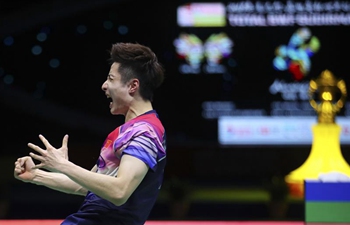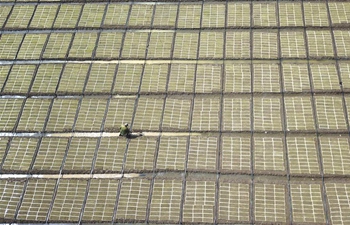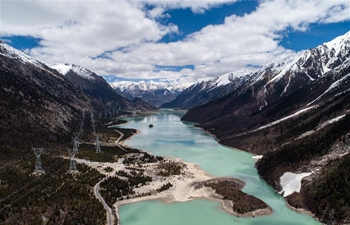
Manfred Weber, leader of the center-right European People's Party (EPP) group, speaks at the European Parliament in Brussels, Belgium, May 27, 2019. Voters in Germany, Lithuania, Cyprus, Bulgaria, Greece and Italy cast their ballots on Sunday in elections to the European Parliament (EP). Citizens of the 28 European Union (EU) member countries, among whom over 400 million voters are eligible, are expected to vote over the course of four days, starting from Thursday, to elect 751 members of EP (MEPs) for a five-year term. (Xinhua/Zheng Huansong)
by Wang Zichen
BRUSSELS, May 27 (Xinhua) -- The lead candidates for the European Commission president wrangled over certain issues after provisional results for the European elections were published, with Manfred Weber stressing stability and two other heavyweights either for calling change or end to political "monopoly".
DOUBTS OVER "SPITZENKANDIDAT"
Votes in the 28-member European Union (EU) are being counted after polls closed, and the competition for the bloc's top job -- effectively the chief executive of the EU -- is now in the focus.
The German term of spitzenkandidat, which means "lead candidate", is the most heard word on Sunday midnight in the European Parliament, where lead candidates spoke live on TV.
The spitzenkandidat is meant to represent a European political group for the next president of the European Commission, after current president Jean-Claude Juncker steps down this autumn.
Once the spitzenkandidat for the European People's Party (EPP), Juncker was the first European Commission president to be chosen in this way.
But he may also be the last, since not all EU leaders -- notably French President Emmanuel Macron -- believed that the system should continue.
For Manfred Weber, the EPP's lead candidate this time, the spitzenkandidaten system surely fits him, because the EPP this year is again voted to be the biggest group in the European Parliament.
"In the European election campaign, I promised stability. And you vote for EPP on the European level, you will get a family or group who is ready to create stability," Weber said.
STABILITY OR CHANGE
Weber's competitors do not agree with his characterization, and instantly found fault with his choice of words.
Frans Timmermans, lead candidate of the Progressive Alliance of Socialists and Democrats, the second largest party group in the European legislature, said "stability is not the first word that comes to mind when I think of Europe. Stability means keeping things as they are."
"I don't think that's what Europe needs. You need to dynamically look toward to the future and take necessary steps to bring that future closer," he said, suggesting a different way forward.
Another top contender for the job is Margrethe Vestager, lead candidate of the Alliance of Liberals and Democrats for Europe group, the third largest political force in the European legislature.
Vestager's job for the past five years has been the European commissioner for competition, in charge of anti-trust issues on the EU level. Her resume includes imposing record fines for Internet giants such as Google for violating competition rules.
"I have worked with breaking monopolies. This is what voters have done today. There is room for talks in the coming days that are different to what we had before, and a different composition of the top jobs".
POSSIBLE STALEMATE
The cause of the uncertainties is rooted in the EU's vague rules regulating how the European Commission president is chosen.
The Treaty of the European Union says "Taking into account the elections to the European Parliament and after having held the appropriate consultations, the European Council, acting by a qualified majority, shall propose to the European Parliament a candidate for President of the Commission. This candidate shall be elected by the European Parliament by a majority of its component members."
Weber, Timmermans and Vestager are the lead candidates of the three largest political groups in the new European Parliament, but none of them has a clear pathway to the throne of the EU, as the legislature is highly fragmented.
The two largest groups -- in the past forming a grand alliance big enough to control the legislature -- fall short of a majority this time. The third largest group, therefore, has leverage to try making itself sort of a "king-maker".
"Manfred Weber, the EPP's lead candidate from Germany and frontrunner for the helm of the commission will have a hard time gathering a majority of the EU's legislative body behind him. The same applies to his main contenders, the Dutch social democrat Frans Timmermans and the liberal Margrethe Vestager from Denmark," said a research note from the Deutsche Bank.
"We do not expect a (European) Council decision before the June 20-21 leaders' summit at the earliest," it said.











